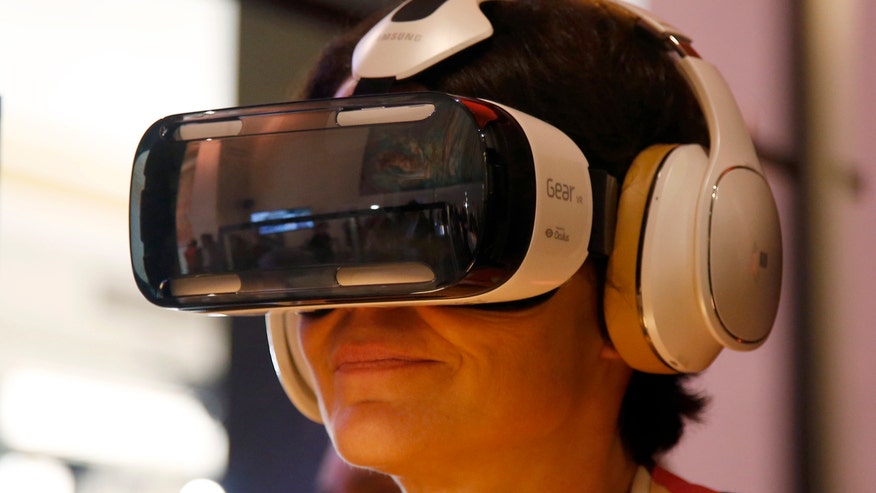By John Brandon

An attendee tries an Oculus-powered Samsung Gear VR headset during the French telecom Orange annual company's innovations show in Paris Oct. 2, 2014. (REUTERS/Charles Platiau)
Boring, dull, and repetitive. That’s the reason a few teens told me they don’t play first-person shooters anymore. Rinse and repeat with a grenade launcher and an AK-47? No thanks.
Then, I showed them the Samsung Gear VR.
You’d think they had just discovered electricity or an alternative universe. In some ways, they had. The teens jumped around, yelped with excitement, and didn’t want to stop playing a few basic flight games and watching movies in the virtual reality theater.
The Gear VR headset is a real game-changer. It costs $200 but requires a Samsung Galaxy Note 4 smartphone (which costs $300 on contract) to provide the immersive video experience, the sound, the processing power, and the storage.
You wear the headset like an oversize pair of headphones (the Samsung Level Over headphones provide more immersion, but cost another $350). There’s a strap that covers the top of your head. The phone snaps into a front compartment using two plastic hinges.
You will be flabbergasted. The Gear VR uses technology developed by Oculus, which is now part of Facebook. What you see transports you to another realm. When you look up, the Gear VR tracks your head movement and you look up in the video. Watch a movie in a virtual theater, and you can look behind you at the projector.
The games are rudimentary. There’s one that involves dodging around asteroids and another that’s basically a trimmed-down shooter. However, you can see the potential.
One of the most remarkable videos puts you right in front of a Cirque du Soleil performance. The artists walk right up to you and then jump onto a rope. You can look up at them, over to the side, or even look back at the theater itself. Another video puts you into an ocean scene. I jerked suddenly (in real life) when I saw a shark swim up behind me.
Somehow, the Gear VR didn’t make me feel nauseated or dizzy, which was my initial response to the first Oculus Rift headset - the one that connects to your computer. The Gear is also quite portable. I used one off and on for an entire day with no battery problems. A 16GB storage card is included - the phone’s slot can hold an SD card up to 128GB.
A few minor gripes? You can’t use an older Samsung Galaxy Note phone or any other smartphone from another company. I’m expecting Samsung to make a Gear VR headset that works with the upcoming Galaxy S6 and S6 Edge smartphones.
Also, some aspects of the growing virtual reality industry are less than family friendly. A company called VirtualRealPorn has already reformatted its content to work on the Gear VR (I refuse to test that kind of material). I can also imagine people getting too preoccupied with violent shooters. After you wear the goggles for more than an hour, when you remove them, there’s a shock that’s similar to waking up from a dream.
Still, the Gear VR is an amazing, immersive experience. I wear glasses and had no problems after adjusting a dial for better focus. Watching the trailer for the movie “Interstellar” I felt like I was gliding over the surface of a planet.
Samsung has some competition in this space. HTC is about to debut its own device called the Vive that uses technology developed at Valve Software. Sony is making a headset called Project Morpheus that will work with higher-resolution games. And, the first Oculus Rift headset for computer games is going to be yet another game-changer when it comes out next year.
For now, Gear VR is best way to experience an alternative universe. Hold on for the ride.
